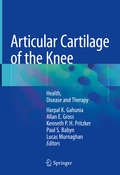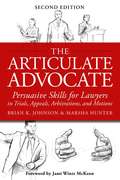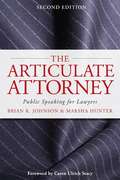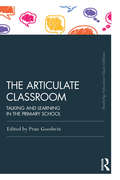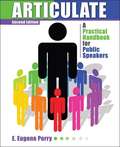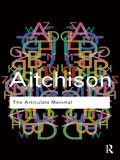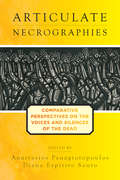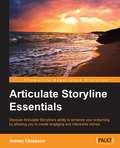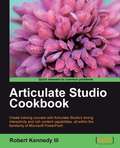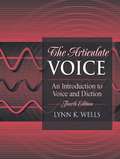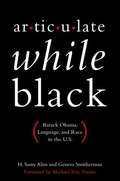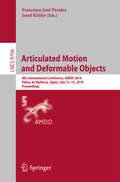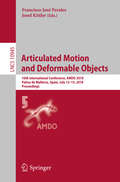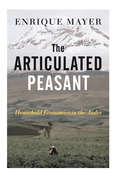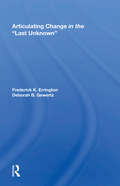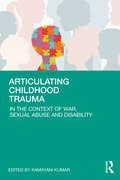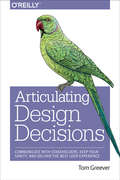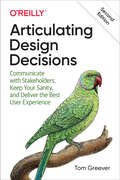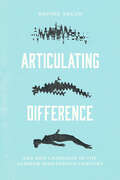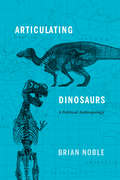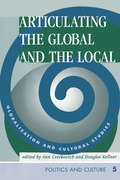- Table View
- List View
Articular Cartilage of the Knee: Health, Disease and Therapy
by Harpal K. Gahunia Allan E. Gross Kenneth P. H. Pritzker Paul S. Babyn Lucas MurnaghanCovering both pediatric and adult populations, this comprehensive text covers the diverse topics related to the health, disease and therapy of articular cartilage of the knee, from basic principles to future directions for research. This vast array of information is arranged into eight sections, encompassing a number of relevant disciplines and covering, in turn, normal articular cartilage, aging and degeneration, evaluation and assessment, non-surgical approaches, surgical approaches, qualitative and quantitative assessment of repair, research into cartilage repair and engineering, and future prospects for therapy. Each chapter is amply referenced and self-contained for independent study and reference. Scoring systems for knee cartilage assessment are included in four appendices as well, rounding out the presentation.A multidisciplinary collection of basic, translational and clinical material, Articular Cartilage of the Knee is a singular resource for orthopedic surgeons, rheumatologists, pathologists and the broad spectrum of professionals working with articular cartilage.
The Articulate Advocate: Persuasive Skills for Lawyers in Trials, Appeals, Arbitrations, and Motions
by Brian K. Johnson Marsha Hunter Jami McKeon Barbara RichiedAn advocate may know what to say but is only effective when he or she knows how to be persuasive. Combining fact with know-how to persuade judges, juries, and arbitrator, the book teaches immediately useful techniques such as how to channel the initial adrenaline buzz, grab and hold the fact finder's attention, gesture while speaking, speaking in phrases, and polishing the persuasive style. Based on 25 years of experience from coaching practitioners, this guide integrates cutting edge discoveries in human factors, gesture studies, linguistics, neuroscience, and sports psychology to give litigators a competitive edge. This brand new edition includes all new illustrations and new information on motions, arbitrations, and appeals.
The Articulate Attorney: Public Speaking For Lawyers
by Brian Johnson Marsha Hunter Caren StacyAddressing the distinctive communication skills expected of attorneys--and based on three decades of experience coaching lawyers--this manual of practical, useful solutions integrates cutting-edge discoveries in human factors, linguistics, neuroscience, gesture studies, and sports psychology. These techniques will transform any attorney into a more confident speaker, whether addressing colleagues in a conference room, counseling clients in a boardroom, or presenting a CLE in a ballroom. Including tips on bringing the presentation off of one's notes and using direct eye contact, the book answers such common questions as: How do I channel nervous energy into dynamic delivery? What is a reliable way to remember what I want to say? How do I stop saying "um" and think in silence instead? and Why is gesturing so important? Topics are divided into chapters on the body, the brain, and the voice, with an extra section specifically dedicated to practice.
The Articulate Classroom: Talking and Learning in the Primary School (Early Years And Primary Ser.)
by Prue GoodwinThis is a classic edition of Prue Goodwin’s acclaimed collection of articles by leading educationalists on the place of talk in the primary curriculum, which now includes a preface from Lyn Dawes. A talking classroom is both a crucial part of every subject area and a subject in its own right. For all primary teachers committed to deepening their understanding of the pivotal role talk plays in learning, this book focuses attention on the importance of fully enabling pupils’ learning potential. Articles, grouped according to a flexible framework, explore: the importance of talk in learning discursive and interactive classrooms talking and learning in the early years talk across the curriculum the importance of storytelling and drama. The new introduction reflects on key research developments since the book was first published. The Articulate Classroom is an engaging introduction to the field which is still very relevant to today’s readers. It will remain an indispensable guide for teachers looking to extend their skills, and a unique chance for education researchers to gain an overview from experts in the field.
Articulate! A Handbook for Public Speakers (2nd Edition)
by E. Eugene PerryArticulate focuses on practical applications on public speaking. It enables students to improve their skills through assignments.
The Articulate Mammal: An Introduction to Psycholinguistics
by Jean AitchisonIn this revised edition, Jean Aitchison has taken account of the considerable changes in Chomskys recent ideas. As a result, the chapters on grammatical innateness, child language acquisition and speech comprehension have been largely rewritten.
The Articulate Mammal: An Introduction to Psycholinguistics (Routledge Classics)
by Jean AitchisonThis Routledge Classics edition includes a new foreword by the author. ‘An excellent and very welcome guide to psycholinguistics…highly recommended.’ The Washington Post A classic in its field for almost forty years, The Articulate Mammal is a brilliant introduction to psycholinguistics. In lucid prose Jean Aitchison introduces and demystifies a complex and controversial subject: What is language and is it restricted to humans? How do children acquire language so quickly? Is language innate or learned? She explains the pioneering work of Noam Chomsky; how children become acclimatized to speech rhythms before birth; the acquisition of verbs; construction and cognitive grammar; and aphasia and dementia. She also considers new topics such as language and evolution and the possibility of a ‘language gene’, bringing the field right up to date. Jean Aitchison was Professor of Language and Communication at the University of Oxford from 1993 to 2003, and is now an Emeritus Professorial Fellow at Worcester College, Oxford. She is the author of numerous books on language and gave the 1996 BBC Reith lectures on the topic of ‘The Language Web’.
Articulate Necrographies: Comparative Perspectives on the Voices and Silences of the Dead
by Anastasios Panagiotopoulos Diana Espírito SantoGoing beyond the frameworks of the anthropology of death, Articulate Necrographies offers a dramatic new way of studying the dead and its interactions with the living. Traditional anthropology has tended to dichotomize societies where death “speaks” from those where death is “silent” – the latter is deemed “scientific” and the former “religious” or “magical”. The collection introduces the concept of “necrography” to describe the way death and the dead create their own kinds of biographies in and among the living, and asks what kinds of articulacies and silences this in turn produces in the lives of those affected.
Articulate Necrographies: Comparative Perspectives on the Voices and Silences of the Dead
by Anastasios Panagiotopoulos Diana Espírito SantoGoing beyond the frameworks of the anthropology of death, Articulate Necrographies offers a dramatic new way of studying the dead and their interactions with the living. Traditional anthropology has tended to dichotomize societies where death “speaks” from those where death is “silent” – the latter is deemed “scientific” and the former “religious” or “magical”. The collection introduces the concept of “necrography” to describe the way death and the dead create their own kinds of biographies in and among the living, and asks what kinds of articulations and silences this in turn produces in the lives of those affected.
Articulate Storyline Essentials
by Ashley ChiassonThis book is for intended for all those interested in working with Storyline to develop engaging e-learning projects. With a user-friendly interface, you don't need any prior experience with Storyline to create and publish your first project.
Articulate Studio Cookbook
by Robert Kennedy IIIThe cookbook style is a series of practical recipes which represent solutions to problems and popular activities in a concise but detailed manner. If you are a beginning developer or just someone who has been asked to be the jack-of-all-design in your training department, then this book is a great starter. Having a working knowledge of PowerPoint is helpful but not essential. By simply following the steps, you will be able to create a clean, professional looking course.
The Articulate Voice: An Introduction To Voice And Diction
by Lynn K. WellsThe Articulate Voice taps into the most current research to clearly and concisely deliver the basics on voice production and techniques for improving pitch, rate, volume, and quality.
Articulate While Black: Barack Obama, Language, And Race In The U. S.
by H. Samy Alim Geneva Smitherman Michael Eric DysonBarack Obama is widely considered one of the most powerful and charismatic speakers of our age. Without missing a beat, he often moves between Washington insider talk and culturally Black ways of speaking--as shown in a famous YouTube clip, where Obama declined the change offered to him by a Black cashier in a Washington, D.C. restaurant with the phrase, "Nah, we straight." <p><p>In Articulate While Black, two renowned scholars of Black Language address language and racial politics in the U.S. through an insightful examination of President Barack Obama's language use--and America's response to it. In this eloquently written and powerfully argued book, H. Samy Alim and Geneva Smitherman provide new insights about President Obama and the relationship between language and race in contemporary society. <p><p>Throughout, they analyze several racially loaded, cultural-linguistic controversies involving the President--from his use of Black Language and his "articulateness" to his "Race Speech," the so-called "fist-bump," and his relationship to Hip Hop Culture. Using their analysis of Barack Obama as a point of departure, Alim and Smitherman reveal how major debates about language, race, and educational inequality erupt into moments of racial crisis in America. <p><p> In challenging American ideas about language, race, education, and power, they help take the national dialogue on race to the next level. In much the same way that Cornel West revealed nearly two decades ago that "race matters," Alim and Smitherman in this groundbreaking book show how deeply "language matters" to the national conversation on race--and in our daily lives.
Articulate Your Purposes: Identifying the Motivations behind the Drive to Lead Adaptive Change
by Alexander Grashow Marty Linsky Ronald HeifetzTaking on adaptive challenges isn't easy. The only reason you would want to do this kind of work is to serve purposes that matter to you deeply. Identifying your higher purposes--figuring out what is so important to you that you would be willing to put yourself in peril--is a key element in the process of understanding yourself on a deep level. Understanding your purposes will help you orient yourself and your decisions within a larger context, while also helping you allocate your time and perform day-to-day tasks. This chapter describes how to clarify your priorities among various orienting purposes and test your assumptions. This chapter was originally published as chatper 18 of "The Practice of Adaptive Leadership: Tools and Tactics for Changing Your Organization and the World."
Articulated Motion and Deformable Objects: 9th International Conference, AMDO 2016, Palma de Mallorca, Spain, July 13-15, 2016, Proceedings (Lecture Notes in Computer Science #9756)
by Josef Kittler Francisco José PeralesThis book constitutes the refereed proceedings of the 9th International Conference on Articulated Motion and Deformable Objects, AMDO 2016, held in Palma de Mallorca, Spain, in July 2016. The 20 papers presented were carefully reviewed and selected from 34 submissions. The conference dealt with the following topics: advanced computer graphics and immersive videogames; human modeling and animation; human motion analysis and tracking; 3D human reconstruction and recognition; multimodal user interaction and applications; ubiquitous and social computing; design tools; input technology; programming user interfaces; 3D medical deformable models and visualization; deep learning methods for computer vision and graphics; multibiometric.
Articulated Motion and Deformable Objects: 10th International Conference, AMDO 2018, Palma de Mallorca, Spain, July 12-13, 2018, Proceedings (Lecture Notes in Computer Science #10945)
by Francisco José Perales Josef KittlerThis book constitutes the refereed proceedings of the 10th International Conference on Articulated Motion and Deformable Objects, AMDO 2018, held in Palma de Mallorca, Spain, in July 2018.The 12 papers presented were carefully reviewed and selected from 26 submissions. The papers address the following topics: advanced computer graphics and immersive videogames; human modeling and animation; human motion analysis and tracking; 3D human reconstruction and recognition; multimodal user interaction and applications; ubiquitous and social computing; design tools; input technology; programming user interfaces; 3D medical deformable models and visualization; deep learning methods for computer vision and graphics; and multibiometric.
The Articulated Peasant: Household Economies In The Andes
by Enrique MayerBased on Enrique Mayer's 30 years of research in Peru, this collection of new and revised essays presents in one accessible volume Mayer's most significant statements on Andean peasant economies from pre-colonial times to the present. As a result, The Articulated Peasant is noteworthy as a sustained examination of household economies as the author explains the relationship of the household and the village community to the Andean mountain environment through systems of land use and agricultural production within changing historical circumstances. Though the volume stresses the Andean context, its relevancy is wider. It will resonate with those who are struggling with issues of survival and development in Latin America or elsewhere where units of production and consumption are largely household based.
Articulating Asia in Japanese Higher Education: Policy, Partnership and Mobility (Routledge Research in Higher Education)
by Jeremy BreadenThis book is a study of cross-border activity in and around Japanese universities, employing ‘Asia’ as the cornerstone of inquiry. It offers qualitative, case-based analysis of Asia-oriented student mobility and partnership projects, framed by critical evaluation of discourses and texts concerning Japan’s positioning in an era of Asian ascendancy. This combination of Asia as theme and international higher education as empirical subject matter allows the book to shed new light on some of the fundamental policy currents in contemporary Japan. It also furnishes a fresh approach to comprehending the modalities of regionalism and regionalisation in the sphere of higher education.
Articulating Change In The ""Last Unknown""
by Frederick K. ErringtonThis remarkable book explores questions of identity and value posed by people living on (or near) the small Pacific island of Karavar in Papua New Guinea. The complex social and cultural changes that occurred during the century after Europeans first arrived in the area have led Karavarans to wonder about-and to assert-who they are and who they migh
Articulating Childhood Trauma: In the Context of War, Sexual Abuse and Disability
by Kamayani KumarThe volume addresses the pertinent need to examine childhood trauma revolving around themes of war, sexual abuse, and disability. Drawing narratives from spatial, temporal, and cultural contexts, the book analyses how conflict, abuse, domestic violence, contours of gender construction, and narratives of ableism affect a child’s transactions with society. While exploring complex manifestations of children’s experience of trauma, the volume seeks to understand the issues related to translatability/representation, of trauma bearing in mind the fact that children often lack the language to express their sense of loss. The book in its study of childhood trauma does a close exegesis of select literary pieces, drawings done by children, memoirs, and graphic narratives.Academicians and research scholars from the disciplines of childhood studies, trauma studies, resilience studies, visual studies, gender studies, cultural studies, disability studies, and film studies stand to benefit from this volume. The ideas that have been expressed in this volume will richly contribute towards further research and scholarship in this domain.
Articulating Design Decisions
by Tom GreeverTalking to people about your designs might seem like a basic skill, but it can be difficult to do efficiently and well. And, in many cases, how you communicate about your work with stakeholders, clients, and other non-designers is more critical than the designs themselves--simply because the most articulate person usually wins.This practical guide focuses on principles, tactics, and actionable methods for presenting your designs. Whether you design UX, websites, or products, you'll learn how to win over anyone who has influence over the project--with the goal of creating the best experience for the end user.Walk through the process of preparing for and presenting your designsUnderstand stakeholder perspectives, and learn how to empathize with themCultivate both implicit and explicit listening skillsLearn tactics and formulas for expressing the most effective response to feedbackDiscover why the way you follow through is just as crucial as the meeting itselfEducate your stakeholders by sharing the chapter from this book on how to work with designers
Articulating Design Decisions: Communicate With Stakeholders, Keep Your Sanity, And Deliver The Best User Experience
by Tom GreeverTalking to people about your designs might seem like a basic skill, but it can be difficult to do well. In many cases, how you communicate with stakeholders, clients, and other nondesigners may be more important than the designs themselves. Because if you canâ??t get their support, your work will never see the light of dayâ??no matter how good it is.This practical guide focuses on principles, tactics, and actionable methods for presenting your designs. Whether you design apps, websites, or products, youâ??ll learn how to get support from people who have influence over the project with the goal of creating the best user experience.Walk through the process of preparing and presenting your designsUnderstand stakeholder perspectives and learn how to empathize with themCultivate both implicit and explicit listening skillsLearn tactics and strategies for expressing the most effective response to feedbackCreate the right documentation for your decisions to avoid repeated conversationsLearn why following through is just as important as the meeting itself
Articulating Difference: Sex and Language in the German Nineteenth Century
by Sophie SalvoEnriches contemporary debates about gender and language by probing the histories of the philosophy and sciences of language. Drawing on a wide range of texts, from understudied ethnographic and scientific works to canonical literature and philosophy, Sophie Salvo uncovers the prehistory of the inextricability of gender and language. Taking German discourses on language as her focus, she argues that we are not the inventors but, rather, the inheritors and adapters of the notion that gender and language are interrelated. Particularly during the long nineteenth century, ideas about sexual differences shaped how language was understood, classified, and analyzed. As Salvo explains, philosophers asserted the patriarchal origins of language, linguists investigated “women’s languages” and grammatical gender, and literary Modernists imagined “feminine” sign systems, and in doing so they not only deemed sex-based divisions to be necessary categories of language but also produced a plethora of gendered tropes and fictions, which they used both to support their claims and delimit their disciplines. Articulating Difference charts new territory, revealing how gendered conceptions of language make possible the misogynistic logic of exclusion that underlies arguments claiming, for example, that women cannot be great orators or writers. While Salvo focuses on how male scholars aligned language study with masculinity, she also uncovers how women responded, highlighting the contributions of understudied nineteenth-century works on language that women wrote even as they were excluded from academic opportunities.
Articulating Dinosaurs: A Political Anthropology
by Brian NobleIn this remarkable interdisciplinary study, anthropologist Brian Noble traces how dinosaurs and their natural worlds are articulated into being by the action of specimens and humans together. Following the complex exchanges of palaeontologists, museums specialists, film- and media-makers, science fiction writers, and their diverse publics, he witnesses how fossil remains are taken from their partial state and re-composed into astonishingly precise, animated presences within the modern world, with profound political consequences. Articulating Dinosaurs examines the resurrecting of two of the most iconic and gendered of dinosaurs. First Noble traces the emergence of Tyrannosaurus rex (the "king of the tyrant lizards") in the early twentieth-century scientific, literary, and filmic cross-currents associated with the American Museum of Natural History under the direction of palaeontologist and eugenicist Henry Fairfield Osborn. Then he offers his detailed ethnographic study of the multi-media, model-making, curatorial, and laboratory preparation work behind the Royal Ontario Museum's ground-breaking 1990s exhibit of Maiasaura (the "good mother lizard"). Setting the exhibits at the AMNH and the ROM against each other, Noble is able to place the political natures of T. rex and Maiasaura into high relief and to raise vital questions about how our choices make a difference in what comes to count as "nature." An original and illuminating study of science, culture, and museums, Articulating Dinosaurs is a remarkable look at not just how we visualize the prehistoric past, but how we make it palpable in our everyday lives.
Articulating The Global And The Local: Globalization And Cultural Studies (Cultural Studies Series: Politics And Culture Ser. #No. 5)
by Ann CvetkovichThis book explores how discourses of the local, the particular, the everyday, and the situated are being transformed by new discourses of globalization and transnationalism, as used both by government and business and in critical academic discourse. Unlike other studies that have focused on the politics and economics of globalization, Articulating the Global and the Local highlights the importance of culture and provides models for a cultural studies that addresses globalization and the dialectic of local and global forces.Arguing for the inseparability of global and local analysis, the book demonstrates how global forces enter into local situations and how in turn global relations are articulated through local events, identities, and cultures. It includes studies of a wide range of cultural forms: sports, poetry, pedagogy, ecology, dance, cities, and democracy. Articulating the Global and the Local makes the ambitious claim that the category of the local transforms the debate about globalization by redefining what counts as global culture. Central to the essays are the new global and translocal cultures and identities created by the diasporic processes of colonialism and decolonization. The essays explore a variety of local, national, and transnational contexts with particular attention to race, ethnicity, gender, and sexuality as categories that force us to rethink globalization itself.
